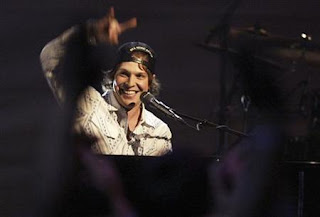 |
| U.S. musician Gavin DeGraw greets the audience as he performs during the ''American Top 40 Live'' show in Los Angeles, California April 24, 2005.Credit: Reuters/Lee Celano |
DeGraw definitely has a female-friendly reputation as a lover, not a fighter. But he's got more moxie than his image might suggest. On his new album, "Sweeter," DeGraw is never exactly pugilistic, but that outer sweetness definitely masks some more interesting shades to his musical personality.
Take the opening title track, an almost rocking stomper in which an uncharacteristically rascally DeGraw threatens to steal someone's girl. For once, the guitar is turned up as loud as the frontman's own keyboards, and producer Ryan Tedder (doing some of his least cloying recent work) distorts the singer's voice, pushing the piano man almost into Lenny Kravitz territory.
The music lightens up over the course of the album, but the thoughts don't always. DeGraw turns in several superior breakup songs on "Sweeter," and occasionally even casts himself as the relative bad guy, as in "Run Every Time," where he confesses, "I know a woman's nature/There's nothing you can save here/Me, I run every time." It almost sounds there like DeGraw is taking lyrical cues from lite-rock's king of commitment-phobia, Counting Crows' Adam Duritz.
If it's wedding songs you want, well, don't worry ... he's still got those in his arsenal. "Soldier" sounds just a little too tailor-made to serenade tuxes and gowns with its promises of eternal protection. With its similar promises of all-time love, "Where You Are" is a slightly more realistic piece of nuptials bait.
But on a few other darker-hued songs, DeGraw proves surprisingly adept at digging into themes of conflict avoidance and romance wrung dry.
He can even get borderline-nasty, as in "Radiation" -- given a big, thick production by funk-rock enabler Butch Walker -- which has a sexually enthralled but psychologically repulsed DeGraw admitting: "I only give in when I get the need/I only come around 'cause I get to leave…/If you get an invitation, I'm probably drunk/You're just as hot as radiation."
Hey, the man can pick a fight.
The bulk of the material still relies on very lightly evoked R&B influences and smooth keyboard melodies, with assistance from additional producers like Eric Ivan Rosse (an old hand at this stuff after his work with piano women Sara Bareilles and Tori Amos).
A character like Bluto would probably still want to smash a Steinway over DeGraw's head, but who knows? "Sweeter's" insensitive songs might even warm a hater up to the sensitive ones. (reuters.com)

